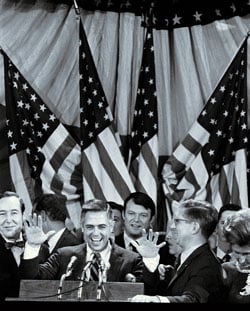January 30, 1976: Buckley v. Valeo Decided

Copyright Bettmann/Corbis/AP Images
Running under the banner of the New York Conservative Party, James Buckley stunned the state’s political establishment by capturing the 1970 Senate race. As a third-party candidate, Buckley had relied on a relatively small circle of donors to help fund his campaign. In 1974, Congress amended the Federal Election Campaign Act of 1971 and put strict limits on campaign contributions. Concerned that the new restrictions “would squeeze independent voices out of the political process,” Buckley and an ideologically disparate group that included former Sen. Eugene McCarthy filed suit challenging the FECA reforms.
Lower courts upheld the legislation, but in early 1976 the Supreme Court issued an unwieldy, unsigned opinion that, most notably, drew a distinction between direct campaign contributions and indirect campaign spending. The high court upheld the $1,000 annual limit on individual contributions, citing a desire to avoid any appearance of quid pro quo corruption, but it invalidated limits on campaign expenditures, holding that spending on behalf of a candidate was protected under the First Amendment.
Critics of the decision—even decades later, there are many—argue that by construing financial support for a candidate as protected speech, the court opened the floodgates to the very interests the original legislation had sought to rein in, making, as Buckley himself noted, “the search for money a candidate’s central preoccupation.”
Write a letter to the editor, share a story tip or update, or report an error.


